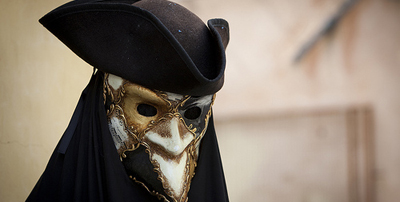Nov 7, 2011 7
On trolls and anonymity
Picture this.
You’re walking down the street one day and a strange figure blocks your path. They’re clad head-to-foot in a black sheet. They’ve got some strange sort of voice scrambler strapped to their mouth beneath, and you hear this grating mechanical voice emerging.
It’s low, sinister, and very, very unnerving. You’re told that you’re worthless, stupid, wrong, and that all manner of terrible tortures will now befall you. There are slurs on your gender, your age, your politics, your sexuality.
At first, you’re shocked. Terrified and horrified.
Then you take stock. This creature…this shambling figure who dare not show their face nor reveal their true voice. This creature, who you now see is wearing a little badly-spelled badge so that their “distinctive” ranting can be identified wherever they choose to spew it out.
And you’re there, unmasked, identifiably, proudly, you. And you think of the feedback you get–good and bad–from those who do show their faces, and who use names which you can check out at least roughly in twenty seconds on Google or Facebook.
And you also think of those who are generally helpful and positive to you, but go under a pseudonym that can’t be easily checked back to an identifiable person.
And you put these in order of importance in your head. And you look again at the grating, shrouded, cowardly figure, and you laugh. They’re at the bottom. Actually, they and their opinions are completely worthless. The out-and-proud are at the top. And the pseudonymous somewhere in the middle.
You begin to laugh at the creature. Not viciously, not gloatingly. Just in mild amusement that anyone, ever could think that this creature mattered. Others join you. A warm buzz of gentle ridicule washes over the creature. It slopes away.
And you walk on.
Now. That’s a twee little tale if ever there was one. A piece of blogger whimsy, and not a little patronising with it. Of course it is. (I hope to God it doesn’t come over as a piece of “mansplaining” by the way. Because it’s not aimed at any group or individual in particular.)
It’s an observation not on “how we stop anonymity”–if you read my stuff on identity on this blog you’ll understand that I don’t believe that’s possible. Instead it’s a sketch of what type of framing it might take to assign anonymous, negative comments such a low value that everyone–from direct recipient to disinterested observer–just goes “oh, yeah, right, ok, anonymous blah, where’s the valuable stuff?”
Idealistic. Yes. I know. And I’ve skirted around a few obvious issues, above.
That the shock and pain of these comments can be so blithely overcome, if at all. And yes, I’ve had some myself, and not done a very good job of prioritising them as unimportant. (By any stretch of the imagination.)
I’ve ignored the physical reality of intimidation–of attacks moving from the space at the bottom of the blog to a text on your phone or a knock at your door. I’m making some big assumptions that the machinery of our society’s protection of the individual, plus a diminishing urge on the part of trolls to convert their keyboard bile into further threats in riskier channels, combine to mean that actually personal safety isn’t endangered that much. But it is sometimes. I know that.
But the key message of this illustration is to suggest that it isn’t just the personal reframing of a recipient of anonymous hate speech that takes us nearer to a solution–if that worked, we’ve have all done it a long time ago.
It’s that we might find the answer in the growth of a collective recognition–in our society and culture–that there is a pecking order of importance, with anonymous, negative right at the very bottom.
It’s obvious that there’s an asymmetry involved: for hate speech to be a problem the original author has to be identifiable to some degree, and the troll almost without exception anonymous. It would be wonderful if that asymmetry also became the foundation of a recognised hierarchy of weight-given-to-commentary. (No fancy technical mechanics here in the giving of points or +1s–I mean a completely, socially-pervasive, understood hierarchy).
And that would extend not just to an author’s reaction to their troll, but to it becoming completely normal for other commentators to perform the online equivalent of shrugging, smiling slightly, and stepping around the shambling, cloaked, figure. No quick fix, of course: but a cultural goal to aim for.
With thanks to Julia Hobsbawm who wrote about this tonight for making me think more about an issue that’s been bubbling away in my head for a while now. I saw other angles on the debate earlier today too, asking how technology might save us from the curse of the troll: a framing of the question, in my view, that will be very unlikely to lead to fruitful answers.
I guess my one-line summary is: the only viable solutions will come from a focus on how we all react, and not on how we police boundaries. Please let’s not get tangled up with more futile attempts at gatekeeping.
